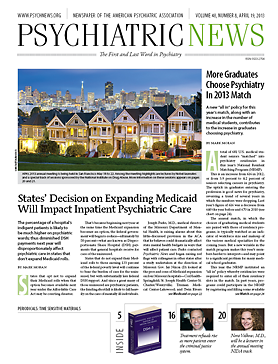Five years ago, the Washington (D.C.) Psychiatric Society launched a Career, Leadership, and Mentorship (CLM) Program for young psychiatrists in the Washington area. It was funded by APA’s Area 3 Council.
The CLM program’s mission includes mentoring young psychiatrists, “engaging at local, regional, national, and international levels,” and contributing to the development of future APA leaders. The program has tackled topics such as the benefits of APA membership, how to set up a private practice, pursuit of an academic research track, and leadership opportunities for APA members-in-training and early-career psychiatrists.
On February 28, several young psychiatrists who have participated in this program, as well as other interested psychiatrists, got together for a celebratory fifth anniversary party at a Washington, D.C., restaurant.
During the gathering, program participants discussed what they have gained from it.
For example, Urooj Saeed, M.D., who comes from St. Lucia in the West Indies and who is a second-year psychiatry resident at Howard University, has had Eliot Sorel, M.D., one of the founders of the CLM program, as a mentor. His help has been invaluable, she said. Currently the two of them are working on a project involving depression screening in primary care settings.
She also described her desire to become an APA member-in-training deputy representative from Area 3 to the APA Assembly. “I got lucky and was thrilled when I was elected,” she said, adding that her message to other young psychiatrists is that it’s important to become involved in organized psychiatry. “You are the future voice of psychiatry!” she declared.
“The CLM program is a wonderful opportunity to network with other psychiatrists and to learn about changes in our field,” Veronica Slootsky, M.D., originally from Ukraine and a second-year psychiatry resident at George Washington University, remarked.
Mona Thapa, M.D., who comes from Nepal and who is a third-year resident at Howard University, did a grand-rounds presentation at Howard University Hospital in collaboration with the CLM program. The title was “Global Mental Health With a Focus on Nepal.”
Several of the speakers also proposed subjects that might be tackled during future CLM program events.
For instance, someone could address policy administration and telemedicine, Thapa suggested. Or perhaps each psychiatrist who is participating in the program could lecture on a topic in clinical care—for example, delirium, Saeed suggested.
Sorel, who organized the CLM anniversary celebration, commented on the current state of health care and psychiatry research in the United States. For example, he said, even though universal health insurance is becoming a reality in the United States, “it is shaky; it is not a done deal,” he ventured. He noted as well that President Obama has proposed a big mission—mapping the human brain—and if that comes to pass, the possibilities for psychiatry, when added to what is being learned from the mapping of the human genome, are enormous.
Addressing the young psychiatrists at the dinner, Sorel said, “Health is a human right,” according to a recently passed United Nations resolution. The United States signed this resolution in December 2012. “So we need optimistic, persistent young people such as yourselves in this game.” ■
More information about the CLM program can be obtained from Sorel at
[email protected].
